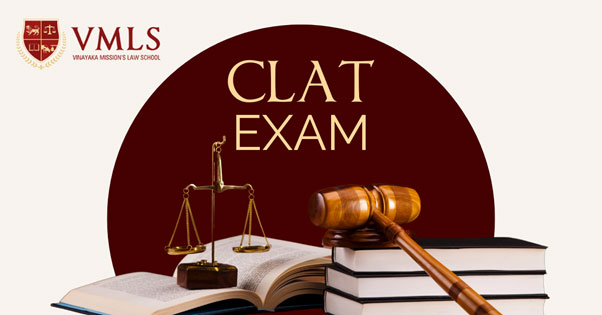Jan 27, 2025
0 Views



CLAT is a national-level entrance exam, and it stands for Common Law Entrance Test. Many top law universities in India consider the CLAT exam scores for admission in their undergraduate and graduate programs. Twenty-four National Law Universities (NLUs) consider the CLAT score for law students. Along with these twenty-four NLUs, the CLAT score is also considered by the other top sixty colleges in India. The test is mainly conducted for admission in the five-year undergraduate LLB and one-year postgraduate LLM programmes.
Every law aspirant dreams of studying in a top law college. So, taking the CLAT exam opens this opportunity for law students. This exam is important as it not only allows students to be eligible for admission to top NLUs but also many Public Sector Undertakings (PSUs) consider the CLAT LLM score for recruiting candidates. Also, the private colleges considering CLAT scores for admission offer various scholarships to rank holders. All these benefits signify the importance of this exam very well. However, the exam is highly competitive, and students must score good marks and a higher rank to get admitted to the most notable law schools in India.
The CLAT eligibility criteria for the undergraduate law course require that the candidates must have passed the 10+2 or any other equivalent examination. The candidate must have a minimum score of 45%. For the SC/ST categories, the minimum valid score is 40%. Candidates who are appearing for the qualification exam in the same year as the CLAT exam are also eligible. However, such candidates need to provide a passing certificate during the admission process. There is no upper age limit to appear in the CLAT exam. Also, the candidates appearing for the exam must be Indian or NRIs.
For the postgraduate programme, candidates having their 3-year or 5-year LLB courses completed are eligible. Even candidates appearing for their qualifying examinations are also eligible to apply for the CLAT exam. Minimum passing marks for postgraduate students is 50% for General/OBC/PWD/NRI categories, and 45% for the SC/ST categories. Similar to the undergraduate programme, there is no upper age limit to appear for the exam, and the student must be Indian or NRI by nationality.
Additionally, one must consider the other eligibility criteria applied by the participating law colleges. This can be done by visiting the law college’s websites that you are interested in. It will help you to stay prepared during the admission process, and eventually help you to get admission to the top NLUs or other best private universities.
The syllabus for the CLAT exam is vast as it prepares you to study a good law course later. The CLAT syllabus for the undergraduate students consists of five sections. This includes the English Language, Current Affairs, Logical Reasoning, Quantitative Techniques, and Legal Reasoning. The English Language section contains questions regarding Grammar, Vocabulary and comprehension. The Current Affairs section has questions based on international and national events. The Logical Reasoning section has questions based on analytical thinking, and Quantitative Techniques include numerical ability and mathematics questions. And, the Legal Reasoning section includes questions based on legal principles. The exam duration is two hours, and there are 120 total questions in the CLAT UG exam, each question having one mark. For each incorrect answer, there is a negative marking of 0.25 marks.
For the postgraduate CLAT examination, the syllabus consists of subjects focusing on the expertise of the students. This includes subjects that can test the student’s proficiency in different types of law. So, it contains questions based on Criminal law, Property Law, Tax Law, Environmental Law, Constitutional law, Company law, Administrative law, Family law, Jurisprudence, and Law of contract. The marking scheme for the CLAT PG examination is similar to the CLAT UG examination. The exam duration is 2 hours, there are a total of 120 questions having one mark each and 0.25 marks are deducted for each wrong answer.
Read This Also : Career Opportunities in Law in India: Roles, Necessary Skills, and Top Employers
While preparing for the CLAT exam, the first step is to understand the syllabus properly. It will help you to start your preparation in a structured manner. You must prepare a study plan and follow it daily in a disciplined manner, providing sufficient time for each subject. Also, it is important to give mock tests and solve sample papers to assess your preparation and brush your weaker subjects. Additionally, you must stay updated with the latest news to score good marks in the current affairs section. Following all these guidelines will help you get into the best law institute in India.
So, that was all the information you needed about the CLAT examination. It is a very competitive examination, and one must prepare well to get into the best law institute in India. Your selection chances can be increased if you follow all the above-mentioned guidelines properly. If you are looking forward to being admitted to law colleges in Chennai, then Vinayaka Mission’s Law School (VMLS) is considered one of the best law colleges in India.
VMLS considers your CLAT score during the admission process and provides the best LLB courses. It is one of the best law colleges in Chennai with highly qualified professors, amazing law courses, and a great campus. So, visit the VMLS website for more information and join the law college to pursue your career as a great lawyer or barrister.
Several students across India are choosing law as a career due to the various benefits it offers.
The 3-year LLB (Bachelor of Legislative Law) programme is an undergraduate programme designed to cater...
Vinayak Mission's Law School (VMLS) is one of the best law schools in India and is being mentored by O. P. Jindal Global...
In India, law is seen as a noble career option, and the number of students interested in pursuing law is increasing.
If you are willing to work in a legal advisory firm, judiciary, or as a lawyer, then pursuing a law degree plays...
CLAT is a national-level entrance exam, and it stands for Common Law Entrance Test. Many top law universities in India.
Many students are developing their interest in law and several fields related to legal studies. After the 12th exam...
Many students in India choose law as a career due to the various benefits this field offers. Although there are several..
LLB stands for Bachelor of Legislative Law, which includes understanding several legal aspects.
Law is one of the most sought-after careers in India. So, having an LLB degree from a good law college helps students...